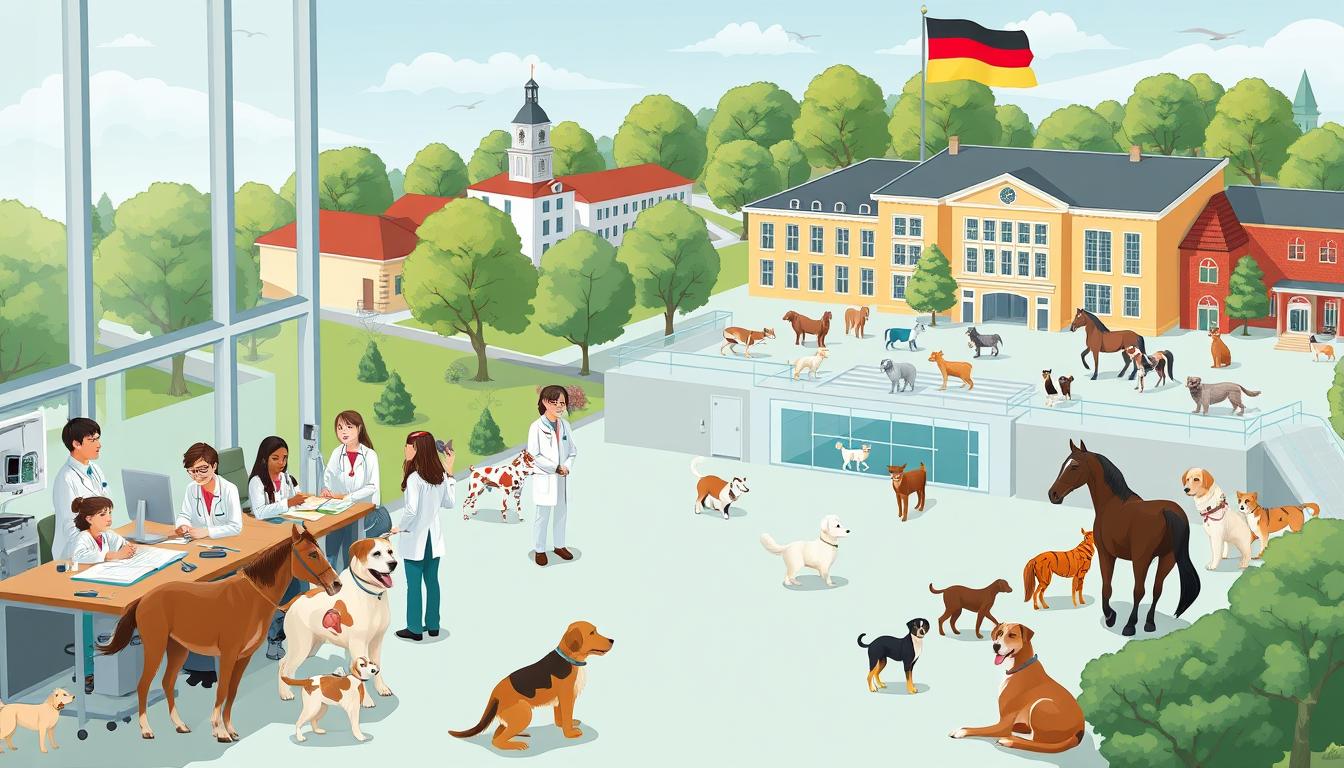In Germany, the journey to becoming a vet is filled with tough university veterinary school requirements. It’s key for those aiming to enter veterinary education. This field is known for its tradition and high standards.
Students need a solid academic base and a dedication to practical training. This shows the high expectations from schools and the vet world. Veterinary programs have a 4-semester pre-clinical phase and a 6-semester clinical phase. This setup prepares students for the vet field1.
Internships in agriculture, vet practices, and public services are vital. They give students real-world experience before they graduate1. With only six universities offering vet medicine and fierce competition, students must have top grades. These grades are similar to those needed for human medicine2.
Key Takeaways
- Understanding the structured veterinary education system is crucial for aspiring veterinarians.
- Practical training through internships is a significant part of veterinary programs.
- High academic standards are required for entry into veterinary medicine in Germany.
- Limited admission to veterinary courses heightens competition among applicants.
- Completion of veterinary studies leads to rigorous examinations and credentials in the field.
Introduction to Veterinary Education in Germany
Veterinary education in Germany is known for its high standards and detailed curriculum. It aims to train veterinarians who can handle animal and public health issues. All courses are in German, so students must be fluent in the language3.
Students learn both theory and practice. This ensures they develop key skills in animal health. It prepares them for various aspects of veterinary work.
Getting into veterinary school is competitive. It’s mainly for EU citizens and those with German high school diplomas3. Finding practical training spots is tough. Students must contact clinics directly for internships3.
The Faculty of Veterinary Medicine offers two doctoral degrees but no PhD program. Those wanting a PhD must apply elsewhere3.
Specialist training in veterinary medicine lasts three years, sometimes two years less4. The application window is from 1 November to 1 February for a start on 1 August 20264. Students split their time between school and work, gaining both knowledge and practical skills4.
There are key exams during training. These include an intermediate test after two years and final exams at the end4.
Overview of Veterinary Programs
Veterinary programs in Germany are designed to give aspiring vets a solid education. These programs last five years and end with a state exam to qualify as a vet. Schools have a set curriculum that covers both theory and practical skills needed for vet work5.
Students learn important subjects like anatomy, pharmacology, and surgery. They also get hands-on experience in clinics6. Each school might have special areas of focus, like small animal care, large animal health, or wildlife management7.
Many schools also offer chances for students to get real-world experience. This can be through internships, volunteering, or jobs in vet clinics. This experience is key to their education and helps them get jobs after they graduate.
| University | Program Duration | Specializations Offered | Clinical Training |
|---|---|---|---|
| University of Munich | 5 years | Small and Large Animal Medicine, Wildlife Health | Extensive clinical rotations |
| University of Berlin | 5 years | Equine Studies, Exotic Animal Medicine | Hands-on practical training |
| University of Leipzig | 5 years | Veterinary Public Health | Internship programs available |
University Veterinary School Requirements
To get into veterinary school in Germany, you need to meet certain requirements. These include both academic qualifications and general admission rules. The Abitur, or university entrance exam, is a key requirement for veterinary school.
Qualification Criteria
Applicants must have a minimum GPA of 3.0 to apply. Your last 60 semester credits are the main focus in the application review8. It’s also important to get recommendations from at least three people, including a vet9.
If you’re moving from a Bachelor’s to a Master’s, you need 30 credit hours. For those going from a DVM to a PhD, you must have at least 42 credit hours8.
General Admission Requirements
General requirements include showing you can speak English well. This can be done with a TOEFL or IELTS test. Non-English speakers need a TOEFL score of 213 or an IELTS score of 68.
You also need to finish all required courses with a C- or better by July 15 before starting9. The school looks for a strong academic record and experience in veterinary settings.
Understanding Application Procedures
Applying to vet schools in Germany has a clear set of steps. You start by applying online through hochschulstart.de. It’s key to know what each program needs.
Online Application Process
The online application is very important. You need to fill out the form carefully to avoid delays. Make sure to meet deadlines and update your profile often.
Required Documentation
Candidates must collect all needed documents for vet programs. These include:
- Certified copies of your education
- Proof of vet and animal experience
- Letters of recommendation from vets
- A personal statement about your goals and experiences
Having all this paperwork ready makes your application stronger. Get your letters of recommendation early. They can really help your chances. Following these steps carefully can lead to getting into vet school.

Types of University Entrance Qualifications
In Germany, there are different ways to get into university. The most common is the Abitur. It’s a traditional way to start higher education. But, some universities also accept subject-specific qualifications. This makes it easier to meet their requirements.
Abitur and Subject-specific Qualifications
The Abitur is a must for most students wanting to study veterinary medicine. They need a good score, especially in subjects like Biology and Chemistry. Subject-specific qualifications can also get you into vet school, if they match the entry criteria.
Vocational Training Paths
Vocational training is another way to get into vet school. It involves practical experience in animal care. This experience shows you have the skills and knowledge needed for vet studies. It’s seen as very important, linking practical skills with book learning.
Language Proficiency Requirements
Language skills are key when applying to veterinary school in Germany. Most courses are in German, so you need to show you can speak it well. Tests like the DSH-2 or TestDaF prove you’re ready. You must score well to join the program.
German Language Tests Explained
To get into vet school, you must pass a German language test. These tests check your reading, writing, listening, and speaking. They make sure you can understand and talk about academic topics. Your score can help you get into the best programs.
| German Language Test | Minimum Score Required | Details |
|---|---|---|
| DSH-2 | DSH-2 or Higher | Test assessing the language skills of non-native speakers for university entrance. |
| TestDaF | Minimum Level B2 | Test for standardized assessment of German language proficiency. |
Knowing German well is important for vet school. It affects your studies and your future career in vet medicine.
Academic Prerequisites for Veterinary Programs
Prospective students need to know the academic requirements for vet school. Most schools don’t require a specific major for admission. But, you must have a bachelor’s degree from a recognized university before starting the DVM program10.
Students must show strong grades in required courses, needing at least a C grade10. When applying, you should have finished about 75% of your needed courses. This means you might have three courses left10.
Vet school requires basic courses like biology, chemistry, and physics with labs11. You’ll also need biochemistry and statistics, though the exact needs vary1011. It’s important to finish each course sequence without mixing formats.
GPA Requirements for Veterinary School
The GPA needed for veterinary school is crucial. Most schools want a GPA of 2.8 to 3.0. But, some schools are more competitive1213. To stand out, applicants usually have a GPA of 3.6 or higher, showing they did well in science12.
Veterinary schools pay close attention to GPA in key subjects like chemistry and biology14. GPA is a big deal in getting into vet school. It’s often combined with test scores to judge applicants14. Also, failing grades in required courses can hurt your chances13.
Having lots of veterinary experience helps too. Cornell University wants at least 400 hours, while UC Davis needs 180 hours12. It’s important to show you’re dedicated to the field, not just meet GPA standards.

Admissions Criteria for Veterinary Schools in Germany
Getting into veterinary school in Germany is tough because there are only a few spots available. Schools look at many things when choosing students. It’s key for applicants to know these criteria well to stand a better chance.
Selection Process Details
The process to get into vet school involves grades, work experience, and the Test for Medical Studies (TMS). Thirty percent of spots are given based on grades. Another sixty percent is decided by the university itself. The last ten percent is for those who do well on the TMS and other tests15.
It’s very competitive to get into vet school. You need top grades and a good score on the TMS to get in. The TMS is especially important for getting into vet school, especially for those in the university selection16.
Importance of the Test for Medical Studies (TMS)
The Test for Medical Studies is a test to see if you’re ready for vet or med school. It costs €100 to take, and you can try again the next year if you fail. If you took it before May 2022, you can try again in a two-year grace period15.
The way spots are given out is complex. It involves a list from 16 universities. This is how they decide who gets in16.
Understanding the College Courses for Vet School
The veterinary curriculum mixes lectures, labs, and clinical training. Students learn about anatomy, physiology, pharmacology, and nutrition. This education prepares them for many roles in veterinary medicine.
In the United States, 33 colleges of veterinary medicine have over 10,000 applicants for about 3,300 spots. This shows how competitive college courses for vet school17 are. Only about 1 in 3 applicants get in, highlighting the need for a strong academic record.
At places like Cambridge University, the vet program lasts six years for new students. Those with degrees finish in five. Students get lots of hands-on experience, like 120 hours of dissection in groups18.
They also do twelve weeks of Pre-Clinical Extramural Studies in the first two years. This is three years for those without a degree first18.
Students have 24-hour access to Clinical Skills Labs. This lets them practice their skills all the time18. These parts of the curriculum make sure graduates are ready for vet medicine’s challenges.
Handling Application Deadlines
Knowing the application deadlines is key for those wanting to get into vet school. The dates for German and international students are different. This affects how they prepare for their applications.
Key Dates for German Applicants
German students need to watch out for important application dates. The main dates for vet school admissions are:
- May 31: Early qualifications submission.
- July 15: Late qualifications submission.
These dates are crucial for the application process. Missing them can hurt your chances of getting in.
Important Dates for International Applicants
International students also have their own deadlines to keep track of. It’s vital to follow these dates to meet all requirements:
- Application for Entry Year 2025: Opens on December 17, 2024, for Fall 2024 grades submission and January 2, 2025, for Fall 2024 grades due19.
- Deadline for completion of all prerequisite courses: May 30, 202519.
- Transcripts submission deadline: Must be within 15 days after the end of the spring semester19.
International students should check all the timelines. They need to understand their requirements well to smoothly go through the application process.
Understanding the Veterinary College Admission Process
The veterinary college admission process is detailed and structured. It helps universities evaluate candidates well. This process makes sure applicants meet clear criteria for vet school entry.
Universities use centralized platforms for application management. This ensures they follow national standards.
For example, the average GPA of students admitted to vet school in 2023 is 3.6. Their science GPA is 3.520. Students usually have a lot of experience, with an average of 1,661 hours in veterinary settings and 1,132 hours with animals20.
They gain experience with different animals, like large, small, and exotic ones20. It’s important for students to balance challenging courses well. This helps them keep a strong academic record.
The admission process values letters of recommendation a lot. These letters should come from veterinarians who know the applicant well20. Even though in-person interviews are less common, they’re still important in many schools.
Students should think about tuition fees and hands-on experiences when choosing vet programs20.
Applicants should show their skills in various veterinary settings. There’s no set number of hours required21. They should also submit a Work Experience Summary form by a certain deadline.
Academic references should show predicted grades that meet vet program standards21.
Veterinary colleges must follow Council policies and have teaching hospitals on campus or formal ties with off-campus facilities22. This ensures students get the right clinical experience.
Special Cases: Applicants with Foreign Qualifications
Applicants with foreign veterinary school diplomas must go through a detailed check. This ensures their qualifications meet German standards. Each case is reviewed separately, and recognition isn’t given automatically23. The rules for recognizing foreign diplomas vary by university, making things more complicated23.
Those wanting to study veterinary medicine must apply for recognition each year. This application window is from 2 April to 30 June23. The deadline for Medicine and Surgery programs is even tighter, from 1 June to 31 July23. Also, students from 55 countries can get help through the ARDI platform23.
Getting total recognition can take up to 90 days after applying23. Applicants might need to pass extra tests, especially for regulated fields like veterinary medicine23. Qualifications over three years old in health fields usually aren’t recognized23. So, candidates need to check their qualification’s age to stay eligible.
Places like the Royal Veterinary College focus on fairness in admissions. They aim to give everyone a chance, no matter their past education24. Their admissions policy is reviewed every year to ensure fairness and transparency24.
Insights into Competitive Admission Process
The vet school admission process in Germany is tough. With few distribution of veterinary study places, applicants face a detailed selection. They must show strong academic skills and other qualifications.
Distribution of Available Places
Every year, about 3,500 spots open up in vet schools across the U.S. This shows how rare these opportunities are25. With so few spots, getting into vet school is hard. Schools accept between 5% and 19% of applicants25.
Students can make their applications stronger by working in vet practices. This experience can help them stand out among other candidates26.
Lottery System for Unfilled Places
Some vet schools use a lottery to fill spots that aren’t taken yet. This way, everyone has a fair shot, no matter their ranking. It makes the admission process fairer for all.
Knowing about the distribution and lottery system is key. It helps students make better choices and improves their chances of getting in26.
Challenges in the Application Process
Applying to veterinary school comes with many challenges in vet school application. The competition is fierce, with only 10% to 15% of applicants getting in. This is because there are only 32 accredited veterinary programs in the United States2728. Students need to have strong grades and lots of experience with animals.
The application process can be very complex. You need to fill out forms, get your transcripts, and possibly take the Veterinary College Admission Test (VCAT). It’s important to pay close attention to every detail to avoid mistakes.
Some schools might accept students with lower grades or GRE scores to increase diversity. This means each school has its own rules. It’s crucial to know these rules and meet the deadlines to have a good chance of getting in2729.
Future Prospects and Opportunities for Veterinary Graduates
The job market for veterinarians is booming, offering many career paths. In the United States, 66% of homes, or 86.9 million, have pets. This means more people need vet services, boosting the career prospects for veterinary graduates30. Graduates can work in clinics, research, or even in wildlife conservation and emergency care.
There are many job openings for veterinarians, including exciting areas like dentistry and surgery30. Veterinarians make about $95,000 a year, while residents earn around $31,00031. Yet, 20% of 2019 graduates had over $300,000 in student loans31.
Veterinary programs are competitive, showing a high demand for education and limited spots30. This makes the path to becoming a vet challenging but rewarding. Scholarships from groups like AAVMC can help with costs. Working part-time in clinics or shelters can also help financially and provide valuable experience31.
Conclusion
Understanding the requirements for university veterinary schools in Germany is key for those aiming to get into vet programs. This summary covers the main points of the application process. It includes writing a strong personal statement, having relevant animal experience, and showing good communication skills.
Veterinary school entry standards keep changing. So, candidates need to be ready to show their best to admissions committees. These committees often look at hundreds of applicants each year3233.
Keeping a high GPA is very important. Most vet schools want scores above 3.534. Also, having lots of hands-on experience with animals is valued. This shows how important it is to prepare well for vet school.
By focusing on meeting vet school entry standards and understanding the requirements, candidates can improve their chances. As veterinary medicine grows, so do the opportunities for graduates in this field.
